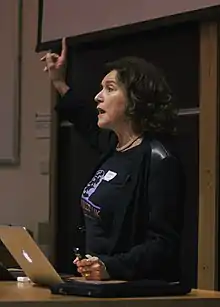Daniela Bortoletto
Daniela Bortoletto is an Italian high energy physicist, head of Particle Physics at the University of Oxford and Nicholas Kurti Senior Research Fellow in Physics at Brasenose College, University of Oxford. She works in silicon detector development and was a co-discoverer of both the Higgs boson and the top quark.[1][2]
Daniela Bortoletto | |
|---|---|
 Daniela Bortoletto speaking at the UK Conference for Undergraduate Women in Physics 2019 | |
| Nationality | Italian |
| Known for | co-discovering the Higgs boson and the top quark |
| Title | Nicholas Kurti Senior Research Fellow in Physics |
| Academic background | |
| Education | University of Pavia |
| Alma mater | Syracuse University |
| Doctoral advisor | Sheldon Stone |
| Academic work | |
| Discipline | Physics |
| Sub-discipline | Particle physics |
| Institutions | University of Oxford, Purdue University, CERN |
| Main interests | Silicon detector development |
Early life and education
Bortoletto grew up in the Italian Alps[3] and studied at the University of Pavia, graduating summa cum laude with a Bachelor in Physics.[1] She was a member of Collegio Ghislieri in Pavia.[4] She earned her PhD in 1989 at Syracuse University,[1][5] under the supervision of Sheldon Stone.[6][7]
Research
Bortoletto moved to Purdue University to pursue a postdoctoral fellowship. In 1994, she received a NSF Career Advancement Award and became the Alfred P. Sloan Research Fellow.[8] While part of the CDF collaboration in 1995, she co-discovered the top quark.[2] Two years later, she won a NSF Faculty Early Career Development Award.[8] In 2004, she gained fellowship of the American Physical Society.[8]
In 2010, Bortoletto became the E. M. Purcell Distinguished Professor of Physics at Purdue University.[1][8] For seven years, she was the upgrade coordinator for the US CMS collaboration,[1] part of the CMS experiment at the Large Hadron Collider at CERN. In 2013, she moved to the University of Oxford, and transferred from the CMS collaboration to the ATLAS collaboration, again working on the LHC. Her research focuses on silicon detector development. Bortoletto became a fellow of the Institute of Physics in 2015.[9] She is an editor for the journal Nuclear Instruments and Methods in Physics Research Section A.[1]
Since 2015, Bortoletto has set up and run the UK arm of the Conference for Undergraduate Women in Physics, held annually in Oxford.[10]
References
- "D. Bortoletto". www.journals.elsevier.com. Retrieved 2018-10-08.
- CDF Collaboration; Abe, F.; Akimoto, H.; Akopian, A.; Albrow, M. G.; Amendolia, S. R.; Amidei, D.; Antos, J.; Anway-Wiese, C. (1995-04-03). "Observation of Top Quark Production in $\overline{\mathit{p}}\mathit{p}$ Collisions with the Collider Detector at Fermilab". Physical Review Letters. 74 (14): 2626–2631. arXiv:hep-ex/9503002. doi:10.1103/PhysRevLett.74.2626. PMID 10057978.
- Support, altcom. "Professor Daniela Bortoletto: Interviewed - Brasenose College, Oxford". www.bnc.ox.ac.uk. Retrieved 2018-10-08.
- Montonati, Paola. "Pavia Cinquant'anni di donne al Collegio Ghislieri". www.paviafree.it (in Italian). Retrieved 2018-10-08.
- "Purdue University :: Speakers". www.physics.purdue.edu. Retrieved 2018-10-08.
- "Interview with Prof. Bortoletto". Trinity Student Scientific Review. 2015-11-21. Retrieved 2018-10-08.
- "Physics Tree - Daniela Bortoletto". academictree.org. Retrieved 2018-10-08.
- University, Purdue Physics and Astronomy, Purdue. "Purdue Department of Physics and Astronomy: Faculty Honors". www.physics.purdue.edu. Retrieved 2018-10-08.
- Physics, Institute of. "New fellows, new members and In Memoriam in August 2015". www.iop.org. Retrieved 2018-10-08.
- "CUWiP 2015 Oxford, UK". www.physics.ox.ac.uk. Retrieved 2018-10-08.